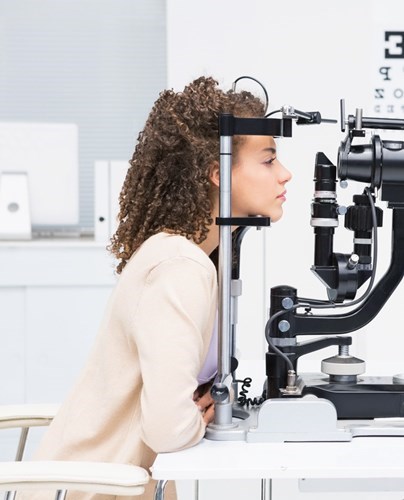How Much Is An Eye Test?
12 February 2019

Learn all there is to know about eye tests
How often should I go for an eye test?
Two years is the maximum time that should pass between each eye test. Even those who feel that they have good vision need to attend regular check-ups to ensure their eyes are healthy, inside and out.
It’s important to remember that eye tests not only check your prescription but also detect conditions such as diabetes and high blood pressure.
Let’s explore where you can go for your eye test, how much it will cost and the alternatives to wearing visual aids.
Where can I go for an eye test?
NHS
You are eligible for a free NHS eye test if you are:
• Under 16
• 16, 17, 18 or 19 and in full-time education
• 60 or over
• Registered as partially sighted or blind
• Diagnosed with diabetes or glaucoma
• 40+ and your mother, father, sibling or child has been diagnosed with glaucoma
• On job-seekers or support allowance
• On a low income and are named on a valid NHS HC2 certificate for full help with health costs
Eye care provider
If you are not entitled to a free NHS eye test, there are many high-street opticians who are available to help. The most recognised include, Specsavers, Vision Express and Asda Opticians.
A simple Google search will show you where your nearest eye care provider is.
Can I go to my GP for eye problems?
GP’s are not eye care specialists like opticians are, and therefore they may not have the expertise to deal with certain eye conditions, or the equipment to examine the eye thoroughly. If you have a serious eye problem that could be sight-threatening, it is best to visit your optician as they can diagnose and treat any conditions you may have.
How much does an eye test cost?
The cost for an eye test in the UK varies, depending on the eye care provider you choose. Prices typically range from £19-25. Contact your local provider for the exact amount.
Here’s a rough guide for three well-known opticians:
Specsavers: £20-25
Vision Express: £10 if you complete your booking online
Asda Opticians: £19
What happens during an eye test?
A standard eye test can take anything from 20-30 minutes. Because everyone’s eyes are unique, this time varies depending on the individual.
All eye tests begin with a discussion. You’ll be asked about your vision, your lifestyle and your last eye test. After this short conversation, there are six machines that could be used during the actual examination.
These include:
• Snellen chart: Most people are familiar with the Snellen chart; which requires patients to read from a set of letters of varying sizes. The purpose of this chart is to test visual acuity (your distance and near vision).
• Autorefractor: The autorefractor will determine your prescription by testing how your eyes focus. A minus prescription indicates that you are nearsighted and a plus prescription indicates that you are farsighted.
• Ocular tonometer: This machine checks the pressure in the eye. This is an essential test as it evaluates the patient’s risk of glaucoma.
• The ophthalmoscope: Used to examine the retina (the light-sensitive tissue lining the back of our eye), a light will be shined into your eye, in order for the optometrist to detect signs of diabetes or high blood pressure.
• Digital retinal camera: Pretty self-explanatory yes, but this is used to photograph the retina; allowing the optometrist to take a record of your retinal health. Slit lamp: The slit lamp examines the cornea, the iris and the lens to check for any injuries or diseases.
Can I do an eye test online?
It is possible to take an online vision test online without having to visit your optician. Many companies offer tests that are available to take with your computer or your smartphone.
An online vision test can check:
- Visual acuity
- Astigmatism
- How sensitive your eyes are to light
- Colour-blindness
However, online vision tests cannot replace regular visits to your optician. This is because these tests only look at your vision, but they don’t check the health of your eyes. They can’t check if you have any conditions that may threaten your sight, such as glaucoma, macular degeneration or cataracts. If you feel you have an eye infection or injury, please visit your eye doctor.

Is there an alternative to wearing glasses or contact lenses?
There are several procedures available that offer freedom from glasses and contact lenses. Ultralase offers a number of minor eye surgeries which can eliminate reliance on visual aids.
Although we will thoroughly evaluate your eyes when you come in for a consultation, we do ask that you have your most recent prescription to hand. This is so we can accurately assess the stability of your eyesight.
Laser Eye Surgery
Most people are familiar with the term Laser Eye Surgery. Ultralase offers two types of laser surgery; LASIK and LASEK. Both of which produce the same outcome; check your suitability here.
If you have been considering laser surgery, it’s a good idea to understand the patient journey. It’s important to us that you feel prepared and comfortable prior to attending a free consultation; so please take a minute to read up on the Ultralase way of working here.
Lens Replacement Surgery
If you are over 40, you may be more suitable for Lens Replacement Surgery. As the most common procedure in the world, it really isn’t as scary as it sounds.
Our highly experienced NHS consultant surgeons can perform this procedure in as little as seven minutes per eye – the local anesthetic administered beforehand means you won’t feel a thing!
Lens replacement can correct farsightedness, nearsightedness, presbyopia, astigmatism and cataracts all with one lens. As many of our staff members have experienced first-hand, the procedure can give you a full range of vision, completely free from glasses!
Back to Blog
